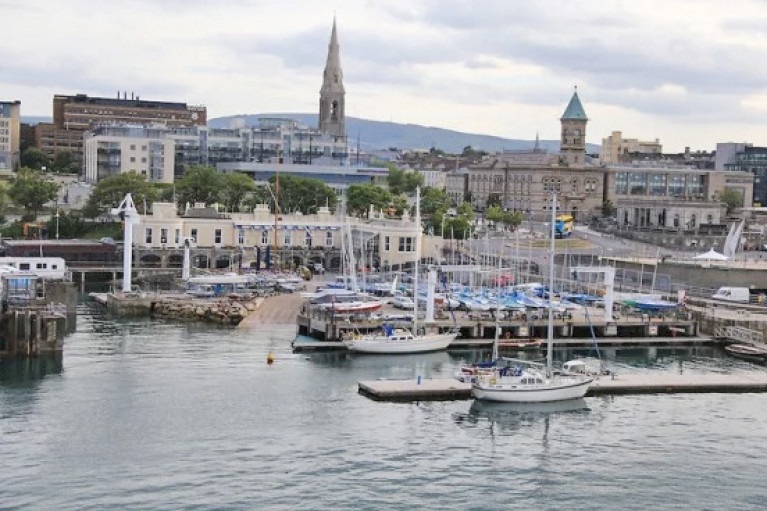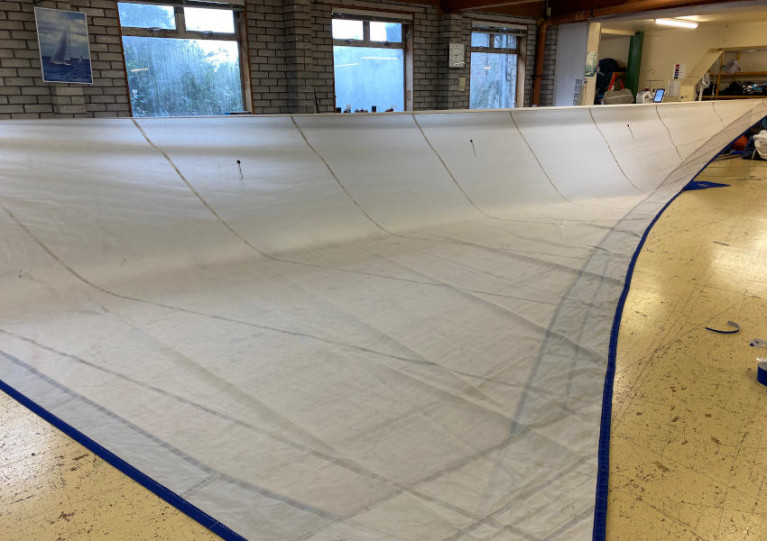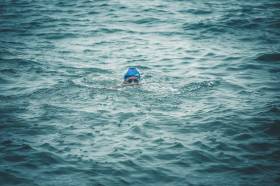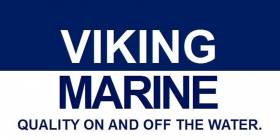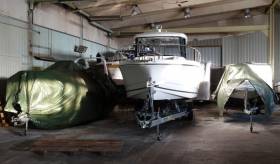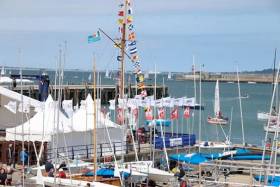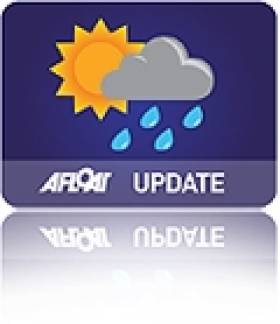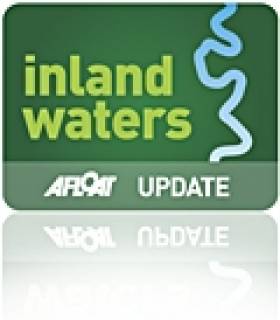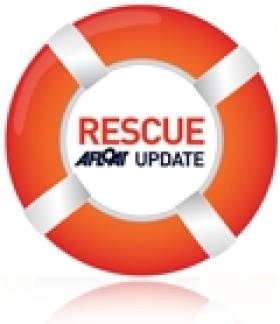Displaying items by tag: WINTER
Winterise Your Boat With CH Marine
CH Marine have everything you’ll need to winterise your boat, with an extensive range of trusted boat care products.
Highlights include the award-winning Meaco DD8L Desiccant Dehumidifier Junior — a cost-effective solution to helping keep your boat (or garage or workshop) mould- and damp-free over the winter months.
And you can choose from a wide selection of polishes and waxes from leading brands like 3M and Starbrite, along with sponges and brushes you can use to keep your vessel in tip-top condition.
As always, CH Marine offers worldwide shipping — and free delivery within the island of Ireland for orders over €50.
Visit CHMarine.com for these items and so much more.
Dinghy Parking Updates From Dun Laoghaire Waterfront Clubs
Summer dinghy parking at the Royal St George Yacht Club in Dun Laoghaire ended this past Sunday 11 October, and all dinghies were expected to be removed by that date to facilitate the club’s annual lift-out.
A limited number of storage slots are available for those signed up for winter training and/or the DMYC Frostbite racing series, and anyone who has not yet done so is invited to apply HERE.
Temporary space has also been secured in the Old Ferry Terminal until Friday 30 October for boats that do not yet have a winter parking slot. Please note that you will need to bring over your own boat and collect it on the assigned dates.
Optimists are currently exempt from these requirements, but storage space is available — with preference given to those actively sailing, who will get the bottom racks.
Meanwhile, the neighbouring National Yacht Club is now taking applications for dinghy platform parking over the winter.
Dinghies taking part in either the junior training sessions or the Frostbite series must complete this form prior to bringing their boats back on the platform.
Boaters must note that platform parking does not reopen before Saturday 31 October as the boathouse still has to lift many keelboats on trailers and position them on the platform following the main lift-out scheduled for Saturday 24 October.
Brexit Makes Your Winter Sails Service An Urgent Matter
What has Brexit got to do with your winter sails service this year? Barry Hayes of UK Sailmakers Ireland, explains the situation and why it’s such an urgent matter.
Dear customers, I want to let you know it’s really urgent if you need your sails washed and laundered to get them into us ASAP. The issue is Brexit, and specifically tariffs that will apply in the New Year without a trade deal in place.
If you need your sails washed, they need to go to Tiptop in England who are the only people who wash sails properly to UK Sailmakers’ standards. To get them washed and cleaned and back to Ireland before the Brexit tariffs will be applied after 1 January, time is now running out.
I know the season has been short and your sails haven’t been used much. But the service team at UK Sailmakers Ireland have the space and knowledge to get them serviced correctly and at the right price. Our team at the loft check every detail of your sail, making sure it’s ready for the new season.
Being mindful of the delayed season start with COVID-19 and associated restrictions, now as we get to the end of the season it’s more urgent than ever to get your sails in for service. Doing so now gives you the best option to be in early for the next season and make the most of 2021.
We are the most experienced people in the business at servicing your sails and have been doing so for more than 50 years, getting your every detail right so you can enjoy your coming season sailing. We have the space to stretch out your sail, fully hang it up to repair and replace a full UV cover, giving your sail the greatest longevity possible.
Contact UK Sails service manager [email protected]
Bite-Sized Tips From Viking Marine For Staying Warm On Water
When it comes to safety and warmth on the water, we all know how important our gear is, and we wouldn’t go sailing in summer without water and suncream.
But we often forget the importance of keeping our blood sugar up to stay warm on the water during the winter.
Making sure you have a snack on board is crucial in keeping warm on the water over the winter, even if you’re only out for a short time.
Bananas, protein bars, chocolate and sandwiches are all great grab-and-go options, whether you’re heading out for a leisurely sail or a Turkey Shoot race.
Winter swimming is also a growing trend, and Viking Marine has responded with a broader sea swimming range that includes dry robes and Zone 3 swim hats, Apollo Goggles and a full range of winter swimsuits now in stock.
And be sure to check out Viking Marine’s online clearance store, with up to 50% off both coastal and technical gear.
From Turkey Shoot To Spring Chicken, Stay Warm & Dry With Viking Marine
Nothing makes us dread heading out on the water more than cold, wet and miserable weather.
But the right winter sailing gear can keep you warm and dry while afloat, whether you’re a Spring Chicken or racing in a Turkey Shoot.
Viking Marine in Dun Laoghaire have pulled together some of the best gear to see you through the winter months — and be sure to drop in store for solutions to your cold fingers, ears or toes!
Top Tips For Winter Boat Maintenance
While some Afloat.ie readers plan to keep sailing through the colder months, and have surely taken note of UK Sails’ recent heavy weather sailing tips, most will have seen or will see their boats lifted out this month.
Either way, this is still an opportune time to maintain your vessel and ensure you’re still ready to sail once spring comes around — and Yachting Monthly has a guide to the essentials you should know for midwinter maintenance.
While modern boatbuilding has made for a hardier product, boat-owners should resist the temptation to simply lift and let live, as frost and cold can affect even the most durable boat.
Don’t put off the small jobs: get your rigging washed and dried, and mend those worn ends. Check your sails over for stitching and any spots of wear or chafing. And remove sensitive electronics like your chart plotter for safer storage at home.
Indeed, clear out your boat as much as you can to keep old and mildew to a minimum. If you’ve lifted out for the winter, be sure to remove all freezable liquids, too, on the off chance a leak leads to hull damage in sub-zero temperatures.
National Yacht Club Sets Date For 2018 Winter Liftout
#NYC - Lift-out day on the National Yacht Club platform is scheduled for Saturday 13 October, weather permitting.
Platform space is limited and applications for keelboats should be returned as soon as possible, with a cheque made payable to the National Yacht Club and confirmation of intention by email to [email protected].
The winter storage application form should be returned by Wednesday 3 October at the very latest.
Applications for platform parking for dinghies this winter are also available on the NYC website.
Dinghies taking part in either the junior training sessions or the DMYC Frostbite series must complete the relevant form prior to bringing their boats back on the platform.
The club asks members to note that platform parking does not reopen before Saturday 20 October, as the boathouse still has to lift many keelboats on trailers and position them on the platform following the main lift-out.
Cold Winter Coming Up, Sailors Expect Dominant Easterly Winds – Weather Guru
#weather – This Winter 2013/14 may be cold again according to the latest ideas coming from a UK weather guru.
If the latest indications are correct then Ireland is more likely to experience a cold winter than a normal or milder one. Frost and snow would likely be above normal levels across the southern half of Ireland, whilst the north is drier.'
Weatherweb.net Managing Director, Dr Simon Keeling, who produces weekly forecasts for Ireland's largest marina at Dun Laoghaire, stressed to afloat.ie that this was not a forecast for winter, but just a statement as to how models and comparisons with previous years pointed to likely weather this winter.
'For sailors it means that the easterly winds are more dominant than usual. However, it's still early days and weather patterns are constantly changing. But for now it's probably best to plan for a cooler than normal winter.
The guidance notes issued by Keeling details his latest ideas for the coming winter (1st December to 28th February) and discusses the likely weather scenarios that will emerge.
'There has been a change in my thinking over the past few weeks. Initially I was of the opinion that the coming winter would be milder than last year, and that 2012/13 was the winter everyone would remember'.
However, this opinion has been changing recently and this evidence was presented to his clients this morning.
Navigation Restrictions in Enniskillen for Hallowe'en Night Fireworks
#INLAND WATERWAYS - Waterways Ireland is advising all masters and users of the Erne navigation that a fireworks display will take place at Castle Island in Enniskillen on Hallowe'en night around 8pm.
Masters of vessels are advised that in there interest of public safety, there will be no mooring permitted at the Waterways Ireland head office mooring nor at the Henry Street public jetties on the day of the event.
Navigation in the vicinity of Castle Island is also prohibited for the duration of the event.
Alternative mooring is available at the Forum and Regal Pass jetties with easy access to event vantage points. Instructions from safety vessels must be adhered to at all times.
Further information may be had from the Lough Erne manager/warden at the Waterways Ireland head office at +44 48 66 322 836.
Meanwhile, Waterways Ireland also reminds masters and users of the Lower Bann and Shannon waterways that the winter schedule for lock and bridge opening times will take effect from this coming Thursday 1 November, running till Sunday 31 March 2013.
Full details of opening times are available on PDF format for both the Lower Bann Navigation and the Shannon Navigation.
Donegal Skipper's Dramatic Alaska Rescue Story
#RESCUE - A Donegal-born skipper joined in the dramatic rescue of a fishing trawler crew in Alaska recently, the Donegal Democrat reports.
Seamus Hayden Jr, who captains the fishing vessel Clyde, was berthed in Lazy Bay at the southern end of the Kodiak peninsula when he responded to a call from fellow vessel the Tuxedni to assist the stricken Heritage, which was sinking a mile east of nearby Tanner Head.
“I rousted my crew and fired our main engine to join the Tuxedni in the search," he said. "I did not know at that time if the Heritage crew had abandoned ship.
“I informed everyone onboard my vessel to dress for extreme weather and to use utmost caution and a buddy system at all times around the vessel."
Visibility was low due to ice fog and the darkness of the Alaskan winter nights, and as they got closer to the Heritage's location - where the US Coast Guard was attemping a helicopter rescue - conditions were "horrendous", with ice-cold winds of 60 knots.
I was very worried for the safety of all involved, including our own," said Hayden.
The Donegal Democrat has much more on the story HERE.



























